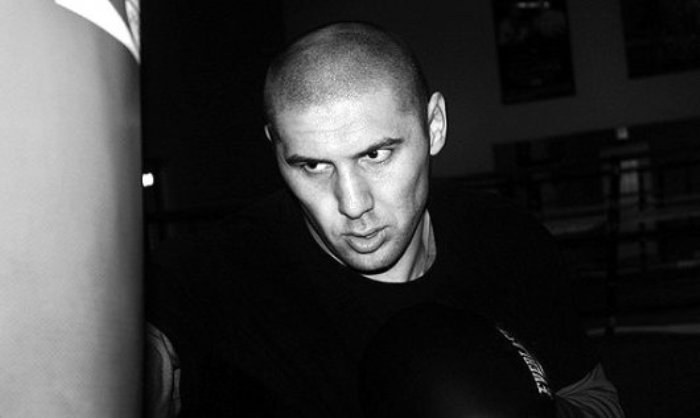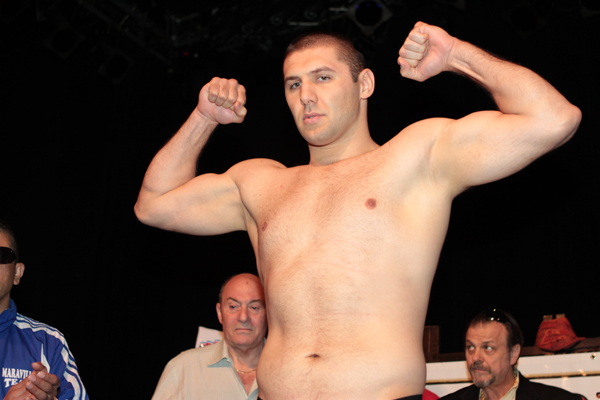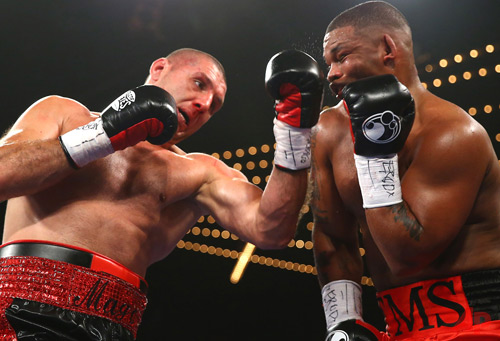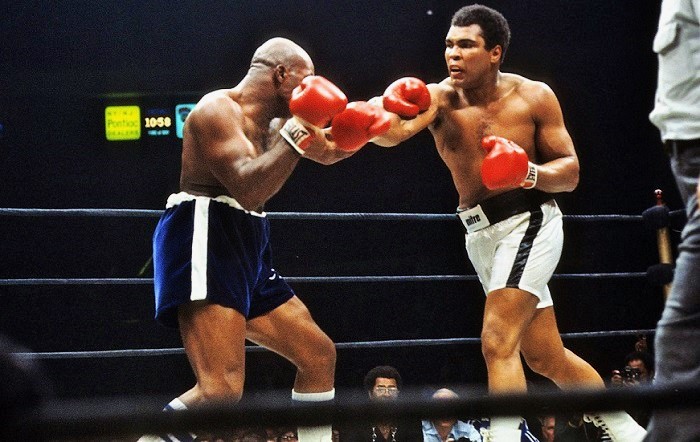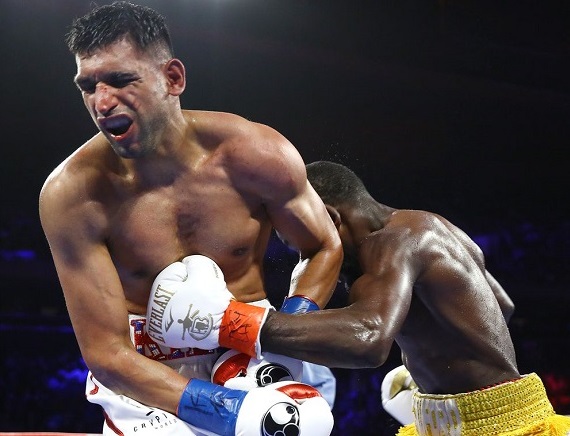Magomed Abdusalamov: Boxing Must Do More
Former heavyweight boxer Magomed Abdusalamov has returned to hospital for treatment of serious blood and bone infections which, according to doctors, are potentially life-threatening. This is just the latest setback for Magomed, who suffered a critical brain injury in his November 2, 2013 match at New York’s Madison Square Garden against fellow top contender Mike Perez. According to Magomed’s wife, Bakanay Abdusalamova, the bedridden native of the Russian Republic of Dagestan has been hospitalized several times in recent weeks for a number of serious infections, as well as for treatment of recurring pressure ulcers in his lower back.
As difficult and serious as Abdusalamov’s present condition is, it is of course much better than a year ago when doctors did not know if he would survive at all. Following the grueling, hard-fought slugfest with Perez, during which Magomed more than once expressed concern to his corner about his condition, the fighter was examined by New York State Athletic Commission doctors who reportedly sutured a cut, gave him a perfunctory neurological test requiring him to read numbers, and then cleared him to travel home. Despite his complaint of head pain, no decision was made to send him to hospital for examination, even though he had absorbed tremendous punishment and had broken facial bones. His handlers were forced to take him by taxi to Mt. Sinai Roosevelt Hospital where he later underwent emergency surgery to remove a blood clot in his brain.
The surgery saved Abdusalamov’s life, but did not prevent severe brain damage and in the aftermath of the operation the fighter suffered multiple strokes and was put in a medically induced coma. He will never be the same. He cannot walk and he cannot speak. Last summer he appeared to be making some progress through rehabilitation and therapy but the prognosis for significant recovery remains slim. However, this past September he did finally return home to be with his wife and three children, a hugely positive development despite the fact he is largely bedridden and in need of constant care. Until these most recent setbacks it was hoped lengthy hospital stays were in the past and the focus would be on his continued rehabilitation. At the moment, much of that hope is lost.
“Since he developed the infections he hasn’t been alert or able to communicate,” Abdusalamova told ESPN. “It’s so agonizing that all of his progress stopped with these recent struggles.”
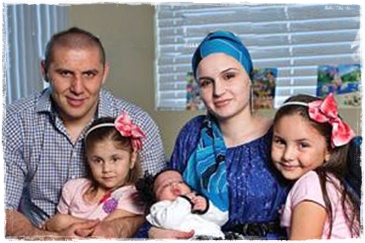
Abdusalamov’s family has launched a lawsuit against multiple parties including the New York State Athletic Commission’s five doctors, the referee and inspector, and the bout’s lead promoter, alleging negligence and medical malpractice. The lawsuit states that the failure of these parties to carry out their responsibilities has resulted in Abdusalamov’s permanent brain damage and disability, ongoing suffering, and a future of never-ending medical care. Recently filed court papers list medical bills totaling almost two million dollars, and that was before these most recent hospital stays.
In the past this situation, except in very rare instances, would not exist for the simple fact Abdusalamov would have died. Advances in medical technology and the treatment of brain injuries are doubtless a factor in Magomed surviving his injury, but now we are left with a number of difficult questions. The most pertinent ones will be examined and hopefully answered through the lawsuit, as well as an ongoing investigation by the New York State Inspector General. But other questions remain and the one on my mind is this: how should boxing respond?
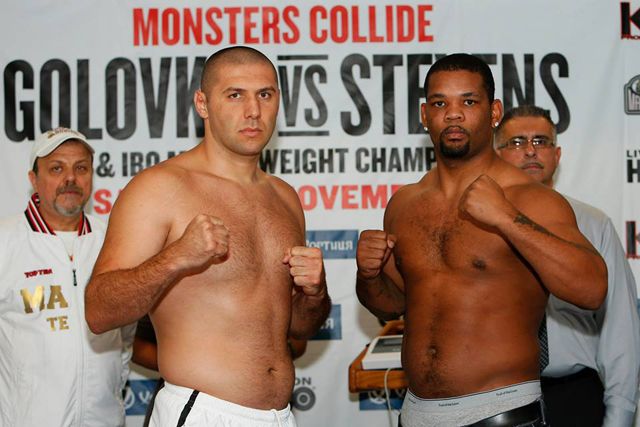
The sport of boxing is of course an inherently dangerous activity. In truth, depending on how one defines the term, it is barely a sport at all; it is legalized, person-to-person combat and every time a boxer steps into a ring, he or she takes a mortal risk. This aspect of prizefighting is often glossed over. It is in fact part of boxing’s appeal, though many fans are reluctant to admit this, while casual sports fans are unaware that the reason boxers donned padded gloves in the first place was not to make blows less damaging, but instead to protect a fighter’s hands, thus allowing him to throw harder punches. Boxing is pure competition, mortal combat, with real blood and pain. Other athletic competitions skirt the dark, visceral edge of the real; boxing lives on it. And this, despite the fact many may say otherwise, is part of what makes boxing so exciting and the performances of its bravest participants so inspiring and exhilarating.
Every year a certain number of boxers suffer serious brain injury or die and on occasion these incidents provoke public revulsion, even calls for the sport’s prohibition. These reactions are keenest when the death or severe injury is seemingly unpreventable, but in Abdusalamov’s case, it’s clear that it might have been avoided. In hindsight, his corner should have responded to his expressions of concern (he reportedly asked several times about the condition of his face) and stopped the match. The referee, or the doctor who examined him between rounds, should have determined the extent of his injuries and considered halting the contest. And the medical officials who appraised Magomed’s condition after the bout most certainly should have had him immediately sent to hospital in one of the available ambulances.
In other words, in this particular case boxing can sidestep the horror of what unfolded by virtue of the fact that multiple layers of protection failed Abdusalamov, making what happened to him something akin to a fluke, or a “perfect storm” scenario. The chances of so many people making so many regrettable decisions at the same time are supposedly slim to none. When everyone does what they’re supposed to do, boxing’s dangers are mitigated (to some degree at least), and so what happened to poor Magomed essentially amounts to bad luck. In other words, shit happens, as they say. But such an analysis dodges the core truth about why Magomed Abdusalamov can no longer hold his wife or respond to his children.
The point I am trying to make is that one year after his near fatal injury, one year after an unimaginably difficult ordeal began for his wife and family, I do not believe professional boxing has reconciled itself at all to the fact that Magomed Abdusalamov is a barely functioning human being because prizefighting exists. His plight has seemingly aroused a tepid response at best from the sport at large. Surely we can and should do better. (Though no doubt the same can be said for many other injured fighters; Gerald McClellan instantly comes to mind.)
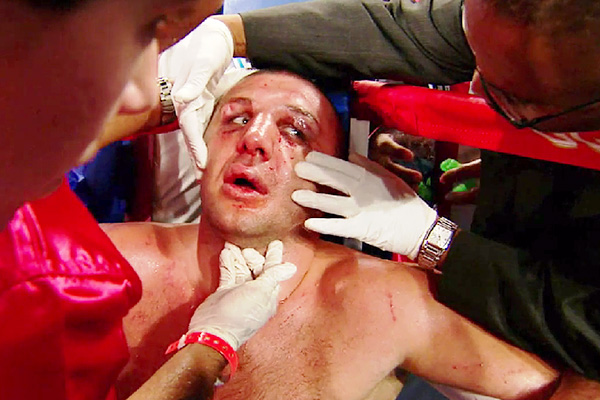
Russian boxing promoter Andrey Ryabinsky has reportedly donated six figure sums to help cover some of Abdusalamov’s medical bills, and The Ring 10 charity continues to collect donations on behalf of the family, and no doubt others have come forward behind the scenes. But where are the high-profile fundraisers for Abdusalamov? Where are the active champions commanding massive paydays publicly stepping forward and donating money? Why haven’t we heard about promoters and broadcasters raising funds and urging boxing fans to do the same?
But beyond that, when severe injuries or deaths happen, I believe boxing should respond in a cathartic and highly visible way. Deaths and brain injuries are an ever present risk. We must accept this fact, not shy away from it. We of course should do everything possible to prevent such outcomes, but to pretend they are not an inherent danger, or simply hope such things won’t happen again, is infantile. They will. And short of banning boxing, the risk can never be eliminated. But that’s part of why we honor the people who do this, why we admire their courage and spirit, and thrill to see them compete. But we must also honor the injured and hurting.
Here’s what I want to see: a major boxing card at Madison Square Garden dedicated to Abdusalamov and his family. With champions announcing they will donate a percentage of their purses to cover his medical bills, and the promoters pledging to help pay for a new rehabilitation center at Mt. Sinai Roosevelt Hospital. I want to see Mike Perez (whose suffering in this tragic outcome should also be acknowledged) standing in the center of the ring next to Abdusalamov in his wheelchair, his wife and children nearby, all of them surrounded by famous boxers and former champions. I want to see the sport rally around a man who has lost almost everything because he had the guts to lace up the gloves and risk his life to give us the privilege of witnessing raw human courage in the flesh. I want boxing to step up and publicly honor Abdusalamov, not shrug its shoulders and whisper about him in hushed and downcast tones.
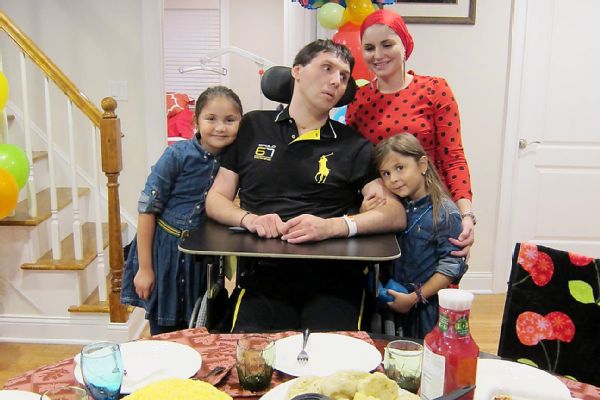
But I know this is unlikely to ever happen. Boxing, a brutal and openly corrupt enterprise which at times seems out of place in present day Western culture, appears no more prepared to accept harsh truths than the rest of us. Denial and wishing away unpleasant facts is the preferred response, especially since being more forthright about the obvious hazards arouses fears of softer tickets sales or renewed calls for boxing’s abolition.
Of course I don’t blame the fighters; if they dwell on the risk, they could lose their edge, their bravery, that desired “killer instinct.” But for the rest of us, no excuse is possible. And the fact is boxing should pay a price for what it costs some of its competitors. And it should have to defend itself against those who see it as merely barbaric. And let’s face it, boxing would otherwise pay a much steeper price for the fact its most famous and beloved champion suffers from brain damage if he wasn’t so wealthy. But Muhammad Ali is the almost unheard-of exception. As a rule, handicapped ex-fighters don’t have fortunes. Wilfred Benitez. Bobby Chacon. Meldrick Taylor. Gerald McClellan. Now Magomed Abdusalamov. And no doubt, many others.
This suffering and loss, these damaged and broken people, this is part of boxing. Either we accept it and try to deal with it — in the open, for all to see — or we are all hypocrites and moral cowards. And not fit to tie Magomed’s shoes.
— Michael Carbert
Note: Ring 10 continues to accept donations which are forwarded directly to Magomed Abdusalamov and his family.

